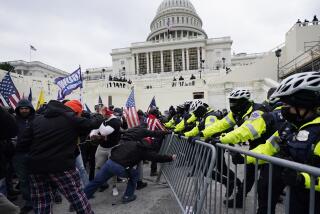Justices Curb Asset Seizures Tied to Drugs
- Share via
WASHINGTON — The Supreme Court reined in one of the federal government’s favorite weapons in the war on drugs, ruling Wednesday that officials may not seize a person’s home or property unless they can show that the owner knew it was tainted by drug profits.
The high court decisively rejected the government’s sweeping claim that it was entitled to seize any property that was linked to illegal drug sales, regardless of how long it had been held or whether the current owner knew of the drug connection.
The 6-3 decision does not shield drug dealers from having all their assets seized. It may, however, protect their relatives, friends and business associates. It will certainly shield persons who buy a house, car or boat from someone they do not know is a drug dealer.
From now on, in federal forfeiture hearings, the key question will be whether the owner of the property had “knowledge” that it was purchased with illegal drug profits.
Defense lawyers, bankers and mortgage lenders, among others, applauded Wednesday’s decision, saying it will ensure that the law punishes only criminals, not those who unwittingly deal with them.
“This is not a victory for drug dealers. It is a victory for property owners,” said Richard Troberman, a Seattle attorney who co-chaired a task force on forfeitures for the National Assn. of Criminal Defense Lawyers.
Although Wednesday’s ruling applies to federal law, state judges are likely to follow it too, Troberman said, because state forfeiture laws were patterned after the federal model.
Justice Anthony M. Kennedy, speaking for the dissenters, derided the ruling and said that it “rips out the most effective enforcement provisions in all of the drug forfeiture laws.”
In the last seven years, federal agents have seized more than $2 billion worth of money and property as part of the war on drugs. This bonanza stemmed from 1978 amendments to the federal anti-drug laws that greatly expanded the government’s power to seize property.
Throughout American history, it has been clear that federal agents could seize money or property from an owner who violated the law. For example, a violation of the Customs Act could result in agents seizing a merchant’s warehouse of imported goods.
But the 1978 drug law also gave U.S. prosecutors the power to seize “all proceeds traceable to” an illegal drug transaction. Thereafter, federal agents could lay claim not only to the drug dealer’s home, bank account and car but also to a home, car or boat that he sold or gave to someone else.
Prosecutors and police praised the law for giving them the power to deal a knockout blow to drug kingpins by seizing all their profits, no matter where they were hidden. Moreover, money from the forfeitures is recycled into the war on drugs.
California has its own forfeiture law, which has brought in more than $130 million since 1988.
In recent years, however, a chorus of complaints has arisen from landlords, homeowners, auto dealers and others who had their property seized under a forfeiture order.
The justices chose to confront the issue in the case of a New Jersey woman whose boyfriend was a drug dealer.
From the late 1970s until 1987, Beth Ann Goodwin and Joseph Brenna lived together in a relationship akin to marriage. Brenna supposedly operated a boat repair business and in 1982 gave Goodwin $240,000 to buy a house in Rumson, N.J.
She has held title to the house since then and lives there with her three children, although she and Brenna split up in 1987.
In 1989, however, federal marshals arrived with an order to seize the house after Brenna had been indicted for running a marijuana importing ring in Florida. U.S. attorneys said that he had been in the drug business since 1982 and that the money for Goodwin’s house came from illegal drug sales.
The law authorizing such forfeitures includes an exception for so-called innocent owners. “No property shall be forfeited,” it says, if the violations of the drug law “have been committed . . . without the knowledge or consent of the owner.”
But the Justice Department maintained that a person such as Goodwin was not the owner of her house because the money to buy it came from drug transactions. Instead, prosecutors asserted that the government had owned Goodwin’s home legally since 1982.
Based on this reasoning, a federal judge upheld the forfeiture order but the U.S. appeals court in Philadelphia reversed the decision.
The high court then agreed to hear the government’s appeal in the case (U.S. vs. 92 Buena Vista Ave., Rumson, N.J., 91-781).
More to Read
Sign up for Essential California
The most important California stories and recommendations in your inbox every morning.
You may occasionally receive promotional content from the Los Angeles Times.














